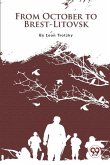Andreyev depicts the fates of five failed leftist revolutionaries and two common peasants who have received death sentences. The condemned await execution by hanging. In prison, each of the prisoners deals with his fate in his or her own way. This is the book that inspired a group of Bosnian revolutionaries to assassinate Archduke Franz Ferdinand, triggering the crisis that led to World War I.
Hinweis: Dieser Artikel kann nur an eine deutsche Lieferadresse ausgeliefert werden.
Hinweis: Dieser Artikel kann nur an eine deutsche Lieferadresse ausgeliefert werden.








